How Belize’s Shift to Solar Power is Revolutionising Business
As energy prices rise and the effects of climate change intensify, many entrepreneurs in Belize are discovering that solar energy is more than just an eco-friendly choice—it’s a practical way to cut costs.
As Belize continues to import electricity from Mexico, many areas, including popular tourist destinations such as the cayes and rainforest eco-lodges, remain off the national grid. In response, businesses are increasingly adopting alternative energy solutions, such as solar power, to reduce reliance on imported fuel.
Whether it’s powering an off-grid facility or maintaining an efficient production line, energy costs can eat into already tight financial margins. But the shift toward renewable energy is not just about saving money; it’s also about sustainability. Entrepreneurs are recognising the growing demand from consumers for eco-conscious businesses, and solar power provides a way for companies to reduce their carbon footprint while becoming more self-reliant.
Sustainability as a Competitive Edge
In today’s business world, sustainability is more than just a buzzword—it’s a key differentiator. Consumers are increasingly prioritising companies that are mindful of their environmental impact, and small businesses in Belize are catching on. Entrepreneurs exploring eco-friendly alternatives, including solar energy, are not only reducing their overhead costs but also positioning themselves as leaders in the growing green economy.
The hot sauce manufacturer, Hot Mama’s Belize, exemplifies this shift in solar energy after installing 75 solar panels (15 KW) on its facility’s roof. The company, nestled in the Cayo District of Belize, was able to take advantage of small loans and grants, including those from the European Union, to make the transition to solar power.
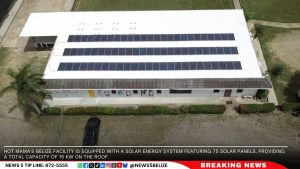
“I believe in helping the environment and doing my part as far as climate change,” said Wilana Oldams, the owner of Hot Mama’s Belize. “The solar installation has helped reduce the overall energy costs, which has allowed Hot Mama’s to become more competitive in a good marketplace.”
Oldams added that the impact was immediate. “We did the solar installation, and the change was immediate,” she explained. “In the first month, we dropped down to about $200, from over $2,000 to $200.” Oldhams says this dramatic reduction in energy costs allowed Hot Mama’s Belize to stay competitive in the marketplace by keeping prices down, even as other companies raised theirs.
As the demand for eco-friendly products grows, this fresh vision of sustainable entrepreneurship is increasingly resonating with Belize’s consumers, who share these values, both locally and even internationally.
Belize: A Model for Sustainable Tourism
While Belizean products are reaching markets abroad, many travellers are coming to the country for its culture, food, and, importantly, its eco-friendly tourism. Over the past few years, Belize has earned its place as a hotspot for environmentally conscious travellers.
Take, for instance, the case of Gaia Riverlodge, an off-grid eco-resort that recently combined solar and hydroelectric power to meet its energy needs. Eight months ago, the resort decided to invest in solar energy to reduce its reliance on fossil fuels and align with its sustainability goals. The resort now operates with a hybrid energy system, integrating 80 solar panels, six SMA inverters, and a 140-kilowatt battery bank with its existing hydro turbine.
“Before we were forced to burn fossil fuel to meet our energy demands, which isn’t in line with what we stand for,” said Nigel Richards, the resort’s general manager. But, with the hybrid grid system, it is now supported by diesel power only as a backup.
According to Richards, the shift to solar has led to a 6-7% reduction in fossil fuel consumption for energy generation compared to the same period last year. Richards says that this drop and the use of solar energy have helped reduce the resort’s carbon footprint. “On average, we’re avoiding 110.2 pounds of CO2 emissions daily, which helps to offset global warming impacts. It’s a small operation that we have, but this is a good step towards doing our part in protecting the environment.”
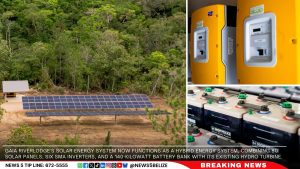
Not only did the resort cut down on fuel costs, but it also helped Gaia Riverlodge become more attractive to eco-conscious tourists. “We find nowadays that a lot of travellers are eco-conscious and are responsible travellers. So knowing that we’re doing this has been drawing a lot of attention and drawing a lot of clients,” Richards added.
With tourism being one of Belize’s leading economic sectors, the transition to solar energy is helping the country become an even more appealing destination for travellers who prioritise sustainability. In fact, just this year in September, Belize hosted the inaugural World Sustainable Travel & Hospitality Awards, where it was named the “World’s Leading Sustainable Destination.” Minister of Tourism & Diaspora Relations, Belize, Anthony Mahler, said, “These wins reflect our nation’s deep commitment to sustainability and responsible tourism. Belize is setting a global example of how tourism and conservation can work hand in hand for the benefit of our people and the planet.”
The benefits of solar energy extend beyond businesses themselves. By embracing green technologies, these businesses are contributing to the broader goal of sustainable development in Belize and creating a ripple effect for others in their communities to follow suit. Solar power is proving to be the ideal solution for businesses in rural areas or off the national grid.
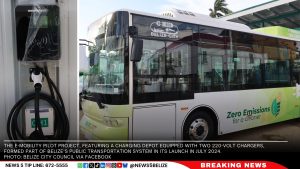
The Growing Market for Solar Energy-Related Services
While many entrepreneurs in Belize are making the leap into solar energy by adopting it within their own businesses, there’s also a rapidly growing market for those who wish to go one step further and provide solar energy-related services. As more companies and individuals seek solar-powered solutions, the demand for installation, maintenance, and battery storage is rising. And with the introduction of electric vehicles and e-buses in July this year in Belize, the need for renewable energy infrastructure, such as solar-powered charging stations, is also expanding.
José Urbina, Chief Executive Officer for the Ministry of Public Utilities, Energy, Logistics, and E-Governance (MPUELE), says this growth is creating a ripe opportunity for aspiring entrepreneurs to enter the renewable energy sector. “When we speak about accelerating the transition, it also comes with upscaling,” Urbina said, adding that there’s a huge opportunity for businesses to provide everything from solar panel installation to energy storage solutions and charging stations for e-vehicles; the opportunities are vast.
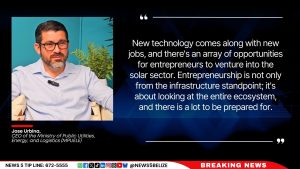
The transition to solar power is changing the way small businesses in Belize operate, grow their revenue, and expand their market presence. For businesses, it means reducing their dependence on imported fuel and insulating themselves from the volatility of energy prices. For entrepreneurs, it’s an opportunity to enter a rapidly expanding market with endless potential.
By: Benita Kemé-Palacio, Digital Content Creator





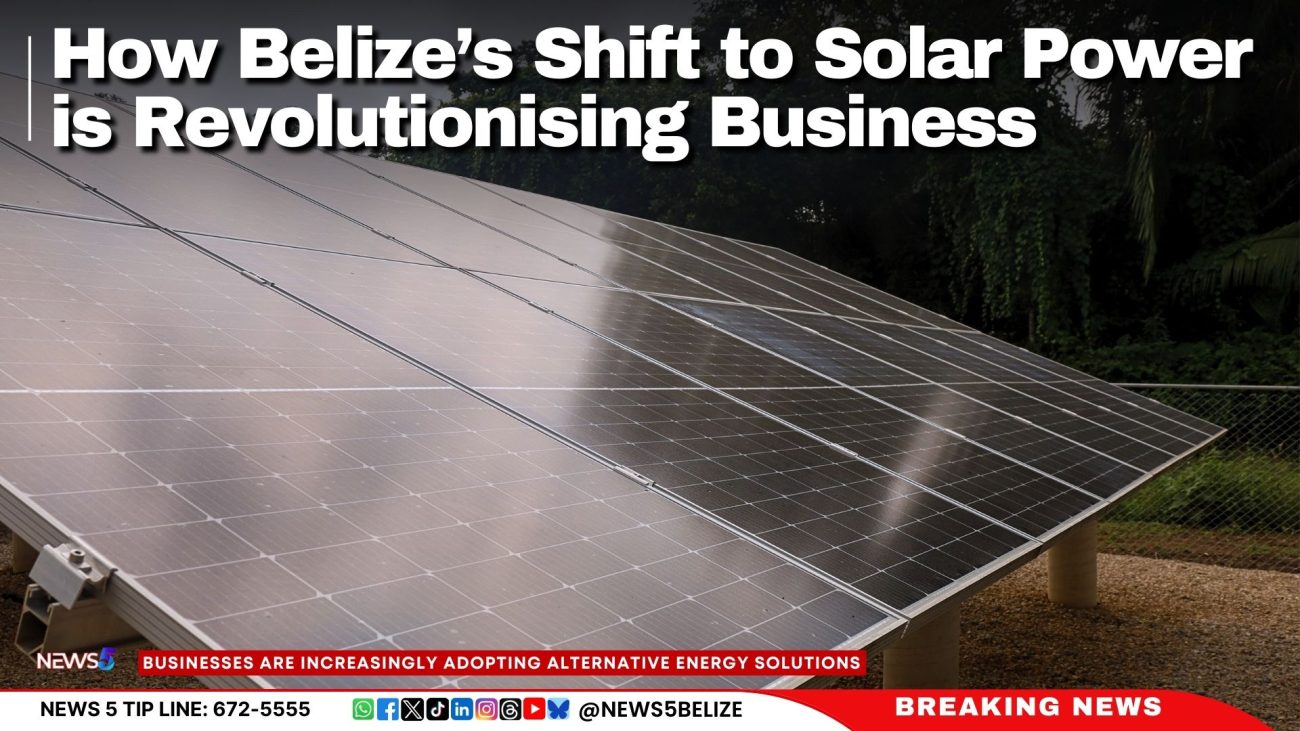

Facebook Comments